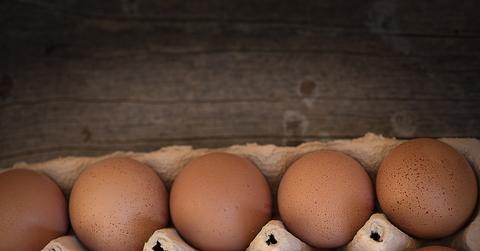Here’s The Nutritional Difference Between Store-Bought And Backyard Chicken Eggs
We are what we eat. And when it comes to chickens, what they eat—or more specifically, what they forage— has a whole lot to do with the health of the eggs they lay. So how do you know which decision is best for you?
Updated May 30 2019, 4:08 p.m. ET
These days, it’s commonly accepted that local, organic food is more nutritious than packaged and store-bought products. But when it comes to chicken eggs, the extent of that nutritional disparity is astonishing. We are what we eat. And when it comes to chickens, what they eat—or more specifically, what they forage— has a whole lot to do with the health of the eggs they lay.
A note about factory-farmed eggs
Factory-farmed eggs come from chickens kept in close quarters at massive scale to produce the maximum possible output.
There are more than 280 million egg-laying hens in the United States confined to battery cages—small wire cages stacked in tiers and lined up in rows inside warehouses. In accordance with the USDA's recommendation to give each hen four inches of 'feeder space' (you read that right: FOUR INCHES), hens are commonly packed four to a cage measuring 16 inches wide. Whether an egg is labeled free-range, cage-free or organic, chances are good that if it came from the grocery store, it was laid by a hen who has never run through an open field, scratched in fresh grass, or even seen the outside world. Cage-free and free-range don’t refer at all to birds being given access to the outdoors—the phrases just mean the birds are kept on factory floors instead of in cages. The hens are often just as cramped, and often more violent toward each other from all the stress.
The exception to the rule are pasture-raised eggs, which are indeed laid by hens with access to outdoor facilities where they are free to do at least some foraging. Birds raised on feed alone miss out on the nutrition that bugs, dirt, plant life and the rest of the outdoors bring, including vitamins from UV rays. And that makes a major difference in the vitamin and mineral counts of the eggs they lay.
Chickens packed in tight quarters and harsh conditions are subjected to high levels of dust and feces at facilities that are generally cleaned only once a year. Dangerous levels of Campylobacter. E. Coli and salmonella all creep into the birds’ eggs. The feed given to factory-raised chickens is comprised of processed grains like corn and soy that are high in cholesterol and low in vitamins and omega-3s.
Nutrition by the numbers
Hens raised on pasture (whether commercially or in a person’s backyard) lay eggs that are lower in cholesterol and fat and higher in beta carotene, omega-3s, and vitamins A, D and E, according to a 2007 Mother Earth News study that has since been verified multiple times.
In specific terms, here are the advantages backyard and pasture-raised eggs have over their competition:
Backyard birds
Given the choice, chickens will eat a large variety of foods that include feed, insects, greenery including grass and flowers, all kinds of bugs, grains, and even small mammals like mice on occasion. This kind of a diet is very high in beta carotene and omega-3s, and extremely low in cholesterol.
These days, it’s easy to find pasture-raised or backyard eggs. Every health food store and farmer’s market offers them, as well as an increasing number of supermarkets. You can often additionally find an abundance of happy, healthy eggs from nearby farms or local homesteaders and hobby farmers. The eggs you get locally rarely cost much more than what you’d find in a supermarket. And of course, raising your own chickens is easy to do and just a few will provide all the eggs an average family could ever want.
